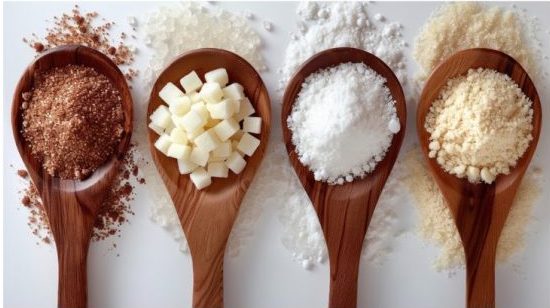Are Artificial Sweeteners Worse Than Sugar?
By John V
November 27, 2024 • Fact checked by Dumb Little Man
For years, artificial sweeteners have been marketed as a healthier choice compared to sugar, especially for those looking to reduce calorie intake or manage their weight. Products including sweeteners like aspartame, sucralose, and stevia have become well-known as substitutes for conventional sugar under claims of being “sugar-free” and “low-calorie.”
However, the debate surrounding the health effects of artificial sweeteners is ongoing. Although they would seem to be a short cure for reducing sugar and calories, concerns about their long-term effects on health—especially with relation to appetite control, metabolism, and possible weight gain—have surfaced. It’s crucial to ask ourselves as we go into this conversation whether these substitutes present a better choice or if the risks exceed the advantages.
Potential Risks of Artificial Sweeteners
Brain and Appetite Response
- Tricking the Brain into Craving More Sweets: Though calorie-free, artificial sweeteners still stimulate sweet taste receptors in the brain, which can lead to confusion. Expecting a sugar spike from anything sweet, the brain could transmit messages encouraging a taste of more sugary items. This can cause a loop of cravings when the brain links sweetness with calorie intake even though no calories are being consumed.
- Increased Appetite: Some research indicates that using synthetic sweeteners could raise general appetite. The sweet taste’s reaction by the brain devoid of associated calories could lead to a mismatch in the body’s hunger signals. Later in the day, this can cause cravings for high-calorie, sweet foods or overeating, therefore raising the total calorie count.
Paradox of Weight Gain
- Fewer Calories, but Potential Weight Gain: People start using artificial sweeteners mostly to cut calorie intake. Research indicates, meanwhile, that their use may ironically cause weight increase over time. Driven by artificial sweeteners, the increase in appetite and demand for sweet or high-calorie items may cause people to consume more calories than they planned, therefore negating any advantages of reducing sugar.
- Disrupted Calorie Control: Artificial sweeteners could make the body less able to control calorie intake. Usually, when we eat sweet-tasting foods, the body expects the calories that ought to accompany them. Sweeteners, however, lack the expected energy, which might throw off the body’s signals of hunger and satiety. This disturbance can cause overeating and trouble limiting calorie intake, which would lead to undesired weight increase
Natural Sweeteners as Alternatives
Honey
A popular natural sweetener, honey is made by bees from the nectar of flowers. It’s a more nutrient-dense substitute for refined sugar since it includes minute levels of vitamins, minerals, and antioxidants.
Stevia
Derived from the leaves of the Stevia rebaudiana plant. Stevia is a natural, zero-calorie sweetener that is much sweeter than sugar. Its ability to offer sweetness without adding calories or increasing blood sugar levels has helped it become somewhat well-known.
Maple Syrup
Produced from the sap of maple trees, maple syrup contains a variety of antioxidants, vitamins, and minerals, including manganese and zinc. It is a more health-conscious substitute for conventional sweeteners since, unlike refined sugar, it has a lower glycemic index and a stronger taste.
Benefits of Natural Sweeteners
- Nutrient-Rich Compared to Artificial Options: Natural sweeteners give vital elements that help the body, unlike synthetic sweeteners, which have either little or no nutritional worth. For instance, maple syrup is a significant source of minerals like manganese, zinc, and calcium; honey provides minute levels of vitamins (B6, C) and antioxidants. Unlike synthetic sweeteners, which have no such advantages, these nutrients can assist in supporting general health in moderation.
- Less Potential Harm and Better for Overall Health: Since natural sweeteners are less likely to interfere with body processes or produce negative long-term effects than synthetic substitutes, they are usually regarded as safer. Natural sweeteners are less likely to aggravate the appetite-regulating problems linked with synthetic sweeteners, such as higher desires or appetite, even while they should still be taken in moderation. Furthermore absent from them are the chemical additions present in many artificial sweeteners, which some studies claim can affect insulin sensitivity, gut health, or metabolism. Thus, for people trying to cut their sugar intake without turning to synthetic substitutes, natural sweeteners are a better choice utilized sparingly.
Moderation is Key
Whether natural or artificial, the key to using sweeteners is moderation. The natural balance of nutrients in your diet can be upset and cravings for additional sugary foods can be triggered by consuming too much of any sweetener, including those that are thought to be healthier, like honey, stevia, or maple syrup. Natural sweeteners still contain sugars or other substances that might alter blood sugar levels if taken in excess, even while they offer certain nutritional advantages including vitamins and minerals. For example, even though honey and maple syrup are nutrient-dense, they are still sugar and, when consumed in excess, can cause weight gain, high blood sugar, and other health problems. To prevent potential injury and promote improved general health, it is crucial to use sweeteners cautiously.
Unprocessed Foods: The Best Choice
There are several health advantages to sticking to unprocessed foods devoid of added sugars or sweets because these foods are usually higher in nutrients, free of artificial additives, and better for preserving a healthy weight. Essential vitamins, minerals, and fiber found in whole foods—such as fresh fruits, vegetables, whole grains, nuts, and seeds—support energy levels, digestion, and general body function. You lower your risk of chronic diseases including obesity, type 2 diabetes, and heart disease by staying away from added sugars and sweeteners. Without the drawbacks of processed foods or artificial sweeteners, a whole-food diet helps control blood sugar levels, enhance metabolism, and support long-term health. This method supports long-term health and vitality by nourishing the body and promoting better eating practices.
Conclusion
The tendency to grab sugar-free snacks or diet sodas needs to be reconsidered. Artificial sweeteners could appear like a healthier option, but their possible long-term hazards might exceed their advantages. Instead, think about using natural substitutes like maple syrup, stevia, or honey, and try to cut back on your sweet tooth completely. You can take advantage of a more sustainable and well-balanced approach to health by choosing whole foods and making thoughtful decisions.
Health Advice
Even the healthiest natural sweeteners should not be consumed in excess; instead, use them sparingly. Give priority to complete, unprocessed foods that are full of vital nutrients and free of added sugars or sweets to ensure that your body is nourished for optimum health.
John V
John is a digital marketing master's student who enjoys writing articles on business, finance, health, and relationships in his free time. His diverse interests and ability to convey complex ideas in a clear, engaging manner make him a valuable contributor to these fields.





